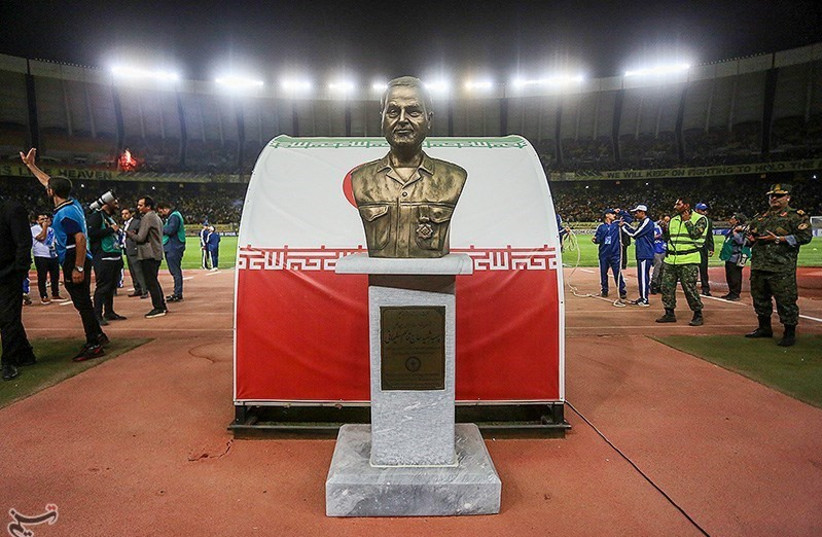A canceled soccer match on Monday night between the Iranian Sepahan soccer team and Saudi Arabia’s Al-Ittihad is an example of the continuing challenges in the Iran-Saudi Arabia relationship.
China helped broker reconciliation between Tehran and Riyadh in March in a momentous deal that appeared to catapult the region into a new era of diplomacy. This looked like it would end almost a decade of increased tensions in the region.
The deal between Saudi Arabia and Iran has many layers, however, and Riyadh is not willing to watch Tehran try to push its politics and aggression into every forum where Saudi Arabia is present. Riyadh seems to sense that Iran is manipulating things. Tehran has done this in the past.
Iran's words and actions in contradiction
Iran likes to push for “diplomacy” abroad but then continues its path of aggression. For instance, after the Iran deal with the West, Tehran didn’t tone down its extremism; rather, it increased its attacks around the Middle East and even exported drones to Russia to be used against Ukrainian civilians.
Iran has also exploited the deal with Saudi Arabia to increase tensions in Yemen. The symbolic aspect of the soccer match is important.

“A furious row erupted on Monday after an Iranian football club tried to use a match against Saudi opponents for political propaganda,” Riyadh-based newspaper Arab News reported. “The AFC Champions League match at the Naghsh-e-Jahan Stadium in Isfahan between Sepahan and Jeddah team Al-Ittihad was called off when the Iranian club refused to remove political banners and busts of the late Revolutionary Guard warlord Qassem Soleimani from the edge of the pitch.”
This is an important decision because it shows that Iran continues to try to exploit things such as sports to push extremism. Soleimani was not just any random Iranian historical figure. He was the Islamic Revolutionary Guard Corps Quds Force commander, and he supported terrorism around the region.
Hezbollah leader Hassan Nasrallah was a key Soleimani ally, and Hezbollah has destroyed Lebanon. Saudi Arabia brokered the Taif agreement to end Lebanon’s civil war in the 1980s, only to see a Hezbollah takeover. Abu Mahda al-Muhandis, another Soleimani ally, carried out attacks in Kuwait in the 1980s.
Therefore, including images of Soleimani is a clear provocation. It is similar to how Iran has “Death to America” rallies. This is about Iran’s chauvinist aggression and that Tehran never knows how to just do diplomacy and peace; it always has to continue to get the last word.
“AFC rules explicitly outlaw the use of a football match to promote a political message,” Arab News reported. “Confederation officials asked Sepahan staff to remove the offending propaganda, but they refused.”
Meanwhile, Iran is playing innocent, claiming that “one side left the competition contrary to professional standards,” Iran’s IRGC-linked Fars News Agency reported. “The other side has not complied with the international rules and protocols in the field of sports.”
Iran says Soleimani is a national hero, and his statue has been at the stadium for almost four years – apparently since January 2020, when Soleimani was killed by a US drone strike in Baghdad.
The Fars report compared images of Soleimani to Saudi stadiums having images of Saudi national heroes: “The strange events of tonight bring to mind the question of whether the politicization of a sports match is a move by Saudi Arabia to get closer to the Zionists, or is Israel seeking to create controversy in relations by infiltrating the Al-Ittihad team?”
This illustrates how soccer is about much more than just a game for both sides. This is not a surprise. In the region and globally, sports is also a stand-in for politics. In some countries in the region, various teams may have supporters whose support for a team is about more than just the team but also their origins or socioeconomic status. This is not unique to the Middle East.
Saudi Arabia also views sports as important on other levels. Riyadh has invested heavily in sports as part of its national and economic agenda, including golf and other international sports, to bring the spotlight to Saudi Arabia as a sports powerhouse. Iran likely knows this and is willing to exploit it.
That Riyadh was willing to walk away from the game is important symbolically because it shows that while Saudi Arabia and Iran have an interest in diplomacy, this new era still has its hurdles. If Iran thought it could get everything it wants from Riyadh and continue to exploit the situation, Tehran may find that Saudi Arabia will stand up for its interests at every juncture.
This has important ramifications for Saudi Arabia’s policies in other places, including in Yemen, Lebanon, and also regarding Israel and peace in the region.
